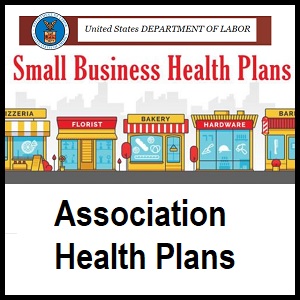
Association Health Plans for Small Groups
WASHINGTON, DC – The U.S. Department of Labor is helping millions of working Americans gain access to quality, affordable health insurance for themselves and their families.
Many small businesses and their employees have struggled with government restrictions that limit access to quality, affordable health coverage. This Association Health Plan (AHP) reform will address many of the inequities between small and large businesses in access to that coverage.
Many small business owners cannot afford to offer health insurance to their employees. The percentage of small businesses offering healthcare coverage has been dropping substantially. For the self-employed, the individual market exchanges do not offer affordable coverage either; premiums more than doubled between 2013 and 2017 with deductibles increasing even more.
This reform allows small employers – many of whom are facing much higher premiums and fewer coverage options as a result of Obamacare – a greater ability to join together and gain many of the regulatory advantages enjoyed by large employers.
Association Health Plans May Reduce Cost To Employers
Under the Department’s new rule, AHPs can serve employers in a city, county, state, or a multi-state metropolitan area, or a particular industry nationwide. Sole proprietors as well as their families will be permitted to join such plans. In addition to providing more choice, the new rule makes insurance more affordable for small businesses. Just like plans for large employers, these plans will be customizable to tailor benefit design to small businesses’ needs. These plans will also be able to reduce administrative costs and strengthen negotiating power with providers from larger risk pools and greater economies of scale.
“President Donald J. Trump is expanding affordable health coverage options for America’s small businesses and their employees. Many of our laws, particularly Obamacare, make healthcare coverage more expensive for small businesses than large companies,” said U.S. Secretary of Labor Alexander Acosta. “AHPs are about more choice, more access, and more coverage. The President’s decision helps working Americans – and their families – purchase quality, affordable health coverage.”
Another Option For Small Groups, Sole Proprietors For Health Insurance
The rule includes several safeguards. Consumer protections and healthcare anti-discrimination protections that apply to large businesses will also apply to AHPs organized under this rule. As it has for large company plans since 1974, the Department’s Employee Benefits Security Administration will monitor these new plans to ensure compliance with the law and protect consumers. Additionally, States will continue to share enforcement authority with the Federal Government.
The Congressional Budget Office (CBO) estimates that millions of people will switch their coverage to more affordable and more flexible AHP plans and save thousands of dollars in premiums. CBO also estimates that 400,000 previously uninsured people will gain coverage under AHPs.
The new rule does not affect previously existing AHPs, which were allowed under prior guidance. Such plans can continue to operate as before, or elect to follow the new requirements if they want to expand within a geographic area, regardless of industry, or to cover the self-employed. New plans can also form and elect to follow either the old guidance or the new rules.
In October 2017, President Donald J. Trump issued Executive Order 13813, “Promoting Healthcare Choice and Competition Across the United States.” The Executive Order called for the Secretary of Labor to consider expanding access to health coverage by allowing more employers to form AHPs. The Department used its delegated authority under the Employee Retirement and Income Security Act of 1974 in developing this regulation.
Information about the rule and other resources are available on the Department’s website.
News Release From Department of Labor
Frequently Asked Questions About Association Health Plans
https://www.dol.gov/general/topic/association-health-plans
2018 Association Health Plans Final Rule DoL
Under the Department's new rule, AHPs can serve employers in a city, county, state, or a multi-state metropolitan area, or a particular industry nationwide. Sole proprietors as well as their families will be permitted to join such plans. In addition to providing more choice, the new rule makes insurance more affordable for small businesses. Just like plans for large employers, these plans will be customizable to tailor benefit design to small businesses' needs. These plans will also be able to reduce administrative costs and strengthen negotiating power with providers from larger risk pools and greater economies of scale.
Frequently Asked Questions About Association Health Plans
How do Association Health Plans work?
- Association Health Plans (AHPs), under the Department of Labor’s rule, are group health plans that employer groups and associations offer to provide health coverage for employees.
- AHPs allow small employers to band together to purchase the types of coverage that are available to large employers, which can be less expensive and better tailored to the needs of their employees.
- The rule allows more employer groups and associations to form AHPs, based on common geography or industry.
- An AHP could offer coverage to some or all employers in a state, city, county, or a multi-state metro area, or it could offer coverage to businesses in a trade or industry group nationwide.
- For the first time, working owners without other employees (including sole-proprietors) and their families will be permitted to join AHPs, creating a new path for these hardworking Americans to access affordable, quality health coverage.
Are AHPs subject to consumer protections?
- The rule includes important safeguards. Consumer protections and healthcare anti-discrimination protections apply to large businesses and will also apply to AHPs organized under this rule.
- AHPs may not charge higher premiums or deny coverage to people because of pre-existing conditions, or cancel coverage because an employee becomes ill.
Can AHPs cherry pick plan participants or discriminate based on health factors?
- No. AHPs cannot cherry pick or discriminate based on health or prior conditions.
- The rule includes important safeguards. Consumer protections and healthcare anti-discrimination protections apply to large businesses and will also apply to AHPs organized under this rule.
Can AHPs vary premiums based on health factors?
- No. AHPs will not be able to charge different premiums to employees based on their health status.
- Additionally, AHPs under this rule will not be able to charge employers different rates based on the health status of their employees.
- The rule includes important safeguards. Consumer protections and healthcare anti-discrimination protections apply to large businesses and will also apply to AHPs organized under this rule.
How does the rule expand coverage options for the self-employed?
- Self-employed individuals who employ other individuals have always been able to join an AHP.
- Under the rule, self-employed individuals with no other employees can also join an AHP, along with their families.
Will states still have regulatory oversight of AHPs under the final rule?
- Yes. The final rule does not diminish state oversight, which remains in place.
- States will share enforcement authority with the federal government.
Does this rule impact existing AHPs?
- No. The new rule does not affect previously existing AHPs, which were allowed under prior guidance.
- Such plans can continue to operate as before, or elect to follow the new requirements if they want to expand within a geographic area, regardless of industry, or to cover the self-employed.
- New plans can also form and elect to follow either the old guidance or the new rules.
Did the Department of Labor consider comments it received in writing the rule?
- Yes. The Department carefully considered all of the approximately 900 comments received during the rulemaking process.
- The final rule summarizes and discusses the comments as part of the preamble.
 Insurance Commissioner Jones issues statement on federal Association Health Plan rule
Insurance Commissioner Jones issues statement on federal Association Health Plan rule
Rule allows plans with history of insolvency issues
SACRAMENTO, Calif. – “Today, the Trump Administration issued its final rule regarding Association Health Plans, described in the rule as a type of Multiple Employer Welfare Arrangement (MEWA), promoting these plans as a path for groups of businesses or organizations to obtain health insurance coverage. Some MEWAS have had a troubling history in California, including cases of MEWA fiscal insolvency, inability to pay consumer claims, and allegations of fraud, so California law prohibits the formation of any new MEWAS. The final rule recognizes continued state regulation of MEWAS; however, outside California, the Trump Administration’s final rule threatens the continued existence of comprehensive health insurance coverage, as those who are sick may no longer be provided coverage that meets their health care needs or may obtain coverage through an arrangement that may later fail when needed most.” – Dave Jones Insurance Commissioner
https://www.insurance.ca.gov/0400-news/0100-press-releases/2018/statement071-18.cfm


